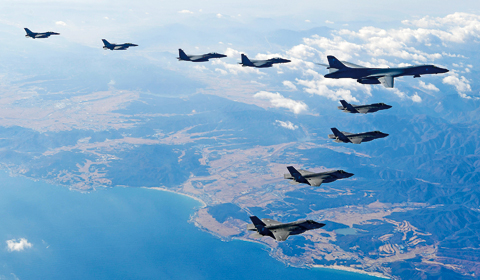North Korea threats spark South Korea arms sales
 SEOUL: A US Air Force B-1B Lancer bomber (right top), two US F-35A (middle) and two US F-35B (bottom) stealth jets fly over South Korea with South Korea’s two F-16 (L) and two F-15K (C top) fighter jets during a joint military drill. —AFP
SEOUL: A US Air Force B-1B Lancer bomber (right top), two US F-35A (middle) and two US F-35B (bottom) stealth jets fly over South Korea with South Korea’s two F-16 (L) and two F-15K (C top) fighter jets during a joint military drill. —AFPSEOUL: The US, South Korea and Japan carried out joint exercises yesterday to track missiles from North Korea, as China warned that such maneuvers fuel tensions following nuclear-armed Pyongyang's longest-range test launch to date. The trilateral drill comes less than two weeks after Pyongyang test-fired a new intercontinental ballistic missile (ICBM) and declared it had achieved nuclear statehood, escalating global alarm over its weapons push.
The two-day exercise-the sixth since June last year-kicked off in waters near the Korean peninsula and Japan, Seoul's defense ministry said. "During the drill, Aegis warships from each country will simulate detecting and tracking down potential ballistic missiles from the North and sharing information," it said in a statement. Two US ships are taking part, with one each from the two Asian countries. Both South Korea and Japan have security alliances with the US, although their own relationship is marred by disputes over history and territory.
Washington and Seoul staged their biggest-ever joint air drill last week in a show of force against the North, which is subject to multiple sets of UN sanctions over its ballistic missile and nuclear weapons programs. The coalition has urged others to take a tougher stance against Pyongyang but has so far found lukewarm reactions from the North's main backers Beijing and Moscow. China criticized the latest drills, which come as President Xi Jinping prepares to host South Korean counterpart Moon Jae-In this week for a summit aimed at soothing ties strained by the US deployment of an anti-missile system in the South.
"The situation is in a vicious cycle of provocation and confrontation. This is not conducive to regional peace and stability," Chinese foreign ministry spokesman Lu Kang told a regular news briefing. "If such a vicious cycle continues and leads to a very bad result, it serves no party's interest," Lu said, echoing recent remarks by Foreign Minister Wang Yi. Russia's top general Valery Gerasimov met Japanese Defense Minister Itsunori Onodera in Tokyo and reiterated that Moscow wanted to resolve the crisis via diplomacy.
"We believe that this issue should only be resolved through political and diplomatic means," Gerasimov was quoted as saying by the Russian defense ministry. Exercises around North Korea "destabilize the situation", Gerasimov said, according to a Japanese defense ministry official. Onodera, however, stressed Japan's position: "North Korea's nuclear and missile development are significant threats against the international community. I want us to cooperate over this problem."China and Russia have called for a halt to such US-led drills in return for North Korean suspending its nuclear program.
Super-large heavy warhead
Tension flared anew in the flashpoint peninsula after the November 29 launch of the Hwasong-15 ICBM, which the North claimed could deliver a "super-large heavy warhead" anywhere on the US mainland. Many analysts suggest that the rocket is capable of reaching the US mainland but voiced skepticism that Pyongyang has mastered the advanced technology needed to allow the rocket to survive re-entry to the Earth's atmosphere.
North Koreas threat
Faced with constant missile and nuclear threats from its belligerent northern neighbor, South Korea is boosting its arms sales and aims to become a major exporter, a study said yesterday. South Korea's arms industry accounted for 2.2 percent of global top 100 producers' sales in 2016, the Stockholm International Peace Research Institute (SIPRI) said in a report listing the world's "top 100" military services. South Korean arms-producing companies' combined sales totaled $8.4 billion (7.1 billion euros) the same year with a 20.6 percent rise in sales compared to 2015, SIPRI added.
"The increasing nuclear weapons capability in North Korea has led to major investments in South Korea," SIPRI Senior Researcher Pieter Wezeman said. In defiance of repeated international condemnations and sanctions, Pyongyang fired an intercontinental ballistic missile (ICBM) last week, which reached an altitude of 4,475 kilometers before splashing into the sea 950 kilometers east of its launch site, North Korean state media said. The North, which says it needs nuclear weapons to protect itself from "hostile" US forces, has vowed to accelerate its weapons programs in response to "evil" sanctions imposed by the UN Security Council.
Once a mainly agricultural backwater devastated by war, South Korea has been one of the world's largest importers of military equipment and technology for decades-mostly from the US-but in recent years its domestic sector has grown rapidly. In the face of North Korean threats, the proportion of government spending that Seoul devotes to defense is among the world's highest outside Middle East and African conflict zones, according to SIPRI's 2016 figures. South Korea is turning "to its own arms industry to supply its demand for weapons" and "aiming to realize its goal of becoming a major arms exporter", SIPRI Senior Researcher Siemon Wezeman said in a statement. - Agencies









